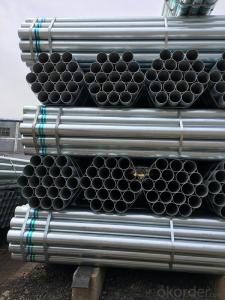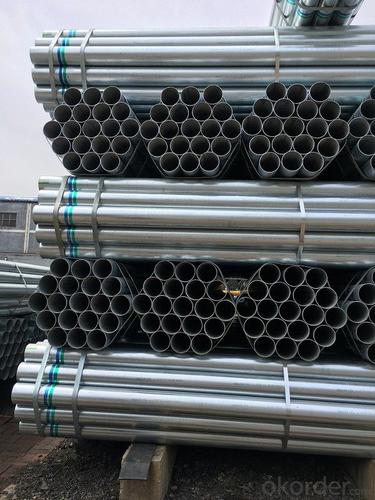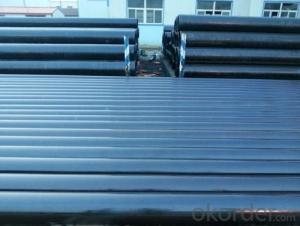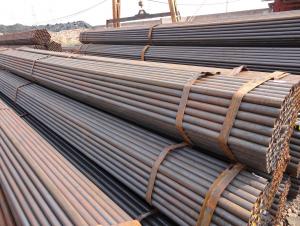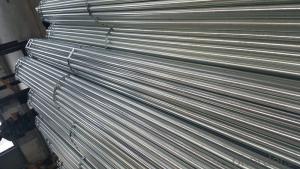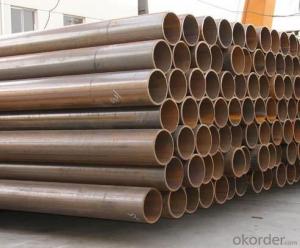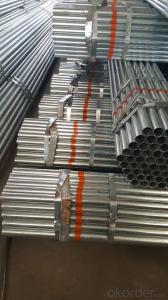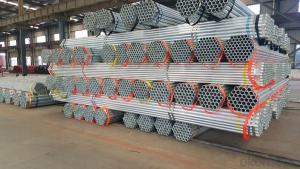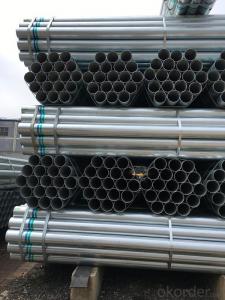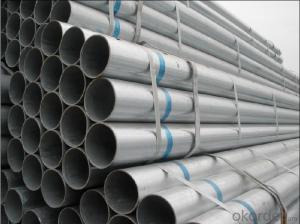Galvanized welded steel pipe for heating water pipe
- Loading Port:
- Shanghai
- Payment Terms:
- TT OR LC
- Min Order Qty:
- 12 m.t.
- Supply Capability:
- 16000 m.t./month
OKorder Service Pledge
OKorder Financial Service
You Might Also Like
Specification
1、Structure of Galvanized welded steel pipe for heating water pipe:
The surface of galvanized steel pipe welded steel pipe of hot dip galvanized layer or. Galvanized can increase the corrosion resistance of the steel tube, prolong service life. Galvanized pipe is widely used, in addition to water, gas, oil and other general low pressure fluid pipelines. It is also used in the petroleum industry, especially for offshore oil field of oil well pipe and oil pipe, chemical, coking equipment of oil heater, condensation cooler, coal run oil exchanger tube, and trestle pile, the mine tunnel support frame tube.
2、Main Features of Galvanized welded steel pipe for heating water pipe:
• High manufacturing accuracy
• High strength
• Good visual effect
• Reasonable price
3、Galvanized welded steel pipe for heating water pipe Specification:
Standard | GB, DIN, ASTM ASTM A106-2006, ASTM A53-2007 |
Grade | 10#-45#, 16Mn 10#, 20#, 45#, 16Mn |
Thickness | 1 - 33 mm |
Section Shape | Round |
Outer Diameter | 21 - 610mm |
Place of Origin | Tianjin, China (Mainland) |
Secondary Or Not | Non-secondary |
Application | Hydraulic Pipe |
Technique | Cold Drawn |
Certification | API |
Surface Treatment | factory state or painted black |
Special Pipe | API Pipe |
Alloy Or Not | Non-alloy |
Length | 5-12M |
Outer Diameter | 21.3-610mm |
Grade | 20#, 45#, Q345, API J55, API K55, API L80, API N80, API P110, A53B |
Standard | ASME, ASTM |
1) Material:Q195 Q235 Q345 X42 X52
2) Specification range:OD:21.3-610mm,WT:6-70mm,length:6-12m or according to the requirement of clients.
3) Excutive standards:GB,ASME API5L.ASTM A 106/A53,Despite of the above standards,we can also supply seamless steel pipe with standard of DIN,JIS,and so on,and also develop new products according to the requirements of our clients!
4) Surface: galvanized.
5) Ends:Beveled or square cut,plastic capped,painted.
6) Packing:bundles wrapped with strong steel strip,seaworthy packing.
4、Packaging & Delivery
Packaging Details: | seaworthy package,bundles wrapped with strong steel strip |
Delivery Detail: | 15-30days after received 30%TT |
5、FAQ of Galvanized welded steel pipe for heating water pipe:
①How is the quality of your products?
Our products are manufactured strictly according to national and internaional standard, and we take a test
on every pipe before delivered out. If you want see our quality certifications and all kinds of testing report, please just ask us for it.
Guaranteed: If products’ quality don’t accord to discription as we give or the promise before you place order, we promise 100% refund.
②How about price?
Yes, we are factory and be able to give you lowest price below market one, and we have a policy that “ for saving time and absolutely honest business attitude, we quote as lowest as possible for any customer, and discount can be given according to quantity”,if you like bargain and factory price is not low enough as you think, just don’t waste your time.Please trust the quotation we would give you, it is professional one.
③Why should you chose us?
Chose happens because of quality, then price, We can give you both.Additionally, we can also offer professional products inquiry, products knowledge train(for agents), smooth goods delivery, exellent customer solution proposals.Our service formula: good quality+good price+good service=customer’s trust
SGS test is available, customer inspection before shipping is welcome, third party inspection is no problem.
6、 Galvanized welded steel pipe for heating water pipe:
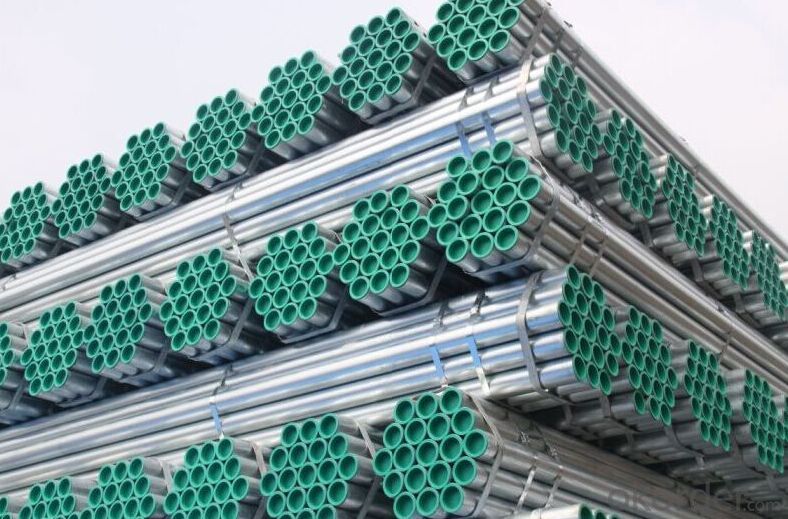
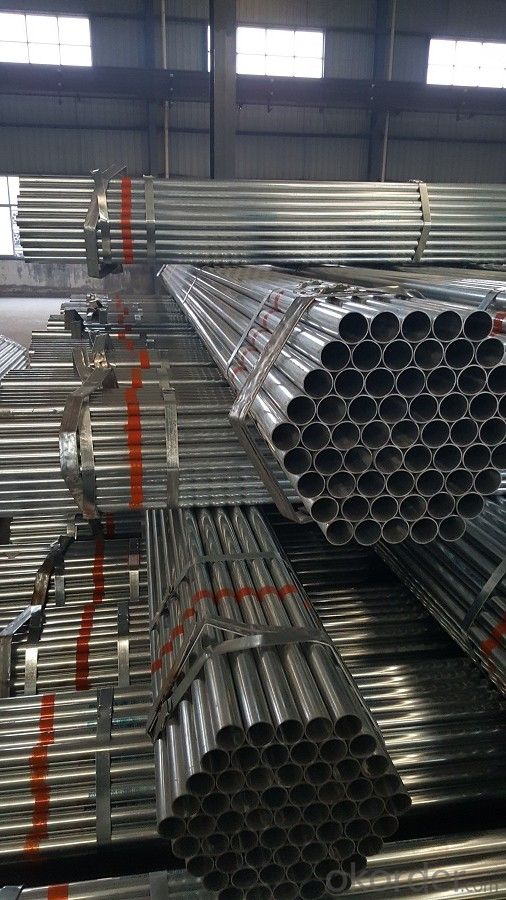
- Q: How do you calculate the pipe flow velocity coefficient for steel pipes?
- The pipe flow velocity coefficient for steel pipes can be calculated using the Manning's equation. Manning's equation is used to calculate the flow velocity in open channels and pipes, and it takes into account the hydraulic radius, slope, and roughness coefficient of the pipe. To calculate the pipe flow velocity coefficient for steel pipes, follow these steps: 1. Determine the hydraulic radius (R) of the steel pipe. The hydraulic radius is calculated by dividing the cross-sectional area of the pipe (A) by the wetted perimeter (P). The formula is R = A/P. 2. Find the slope (S) of the pipe. The slope represents the change in elevation divided by the length of the pipe. It is usually given as a ratio or a percentage. 3. Determine the roughness coefficient (n) of the steel pipe. The roughness coefficient represents the internal roughness of the pipe and can be obtained from literature or pipe manufacturer specifications. It is commonly given in terms of the Manning's roughness coefficient. 4. Substitute the values of hydraulic radius (R), slope (S), and roughness coefficient (n) into the Manning's equation: V = (1/n) * R^(2/3) * S^(1/2) where V is the flow velocity. 5. Solve the equation for V to calculate the pipe flow velocity coefficient for steel pipes. It is important to note that the calculated velocity coefficient may vary based on the specific pipe dimensions, flow conditions, and other factors. Therefore, it is recommended to consult relevant engineering standards or consult with a hydraulic engineer to ensure accurate and reliable calculations for specific applications.
- Q: What are the factors to consider when designing a steel pipe system?
- To ensure the functionality, durability, and efficiency of a steel pipe system, several factors must be taken into account during the design process: 1. It is crucial to determine the maximum pressure and temperature the system will be exposed to. This information is essential for selecting the appropriate pipe material, thickness, and jointing method to withstand the system's operating conditions. 2. The selection of the right material for the steel pipes is important. Factors such as corrosion resistance, strength, and cost should be considered. Common materials include carbon steel, stainless steel, and alloy steel. 3. Calculating the adequate pipe size and wall thickness is essential to ensure the required flow rate and pressure drop within the system. The pipe size directly affects the system's efficiency and must be chosen based on the anticipated flow rates and pressure losses. 4. Proper support and anchoring are critical to prevent sagging, movement, and stress on the steel pipe system. The design should take into account the weight of the pipes, the fluid being transported, and any external forces acting on the system. 5. Expansion joints or loops should be incorporated to allow for thermal growth and contraction, preventing damage and distortion caused by temperature variations. 6. Understanding the properties of the fluid being transported, such as corrosiveness, viscosity, and potential for sedimentation or scaling, is important in selecting the appropriate pipe material and protective coatings or linings. 7. Consideration should be given to the accessibility of the system for installation, inspection, and maintenance purposes. The design should include proper access points, valves, and fittings to facilitate easy maintenance and repairs. 8. Environmental factors such as extreme temperatures, humidity, or corrosive substances should be taken into account when selecting the pipe material, protective coatings, and insulation. 9. Compliance with industry standards, codes, and regulations is essential. The design should adhere to safety guidelines and applicable building codes to ensure the integrity and longevity of the pipe system. 10. The overall cost of the steel pipe system, including material, installation, maintenance, and energy consumption, should be considered. Balancing cost-effectiveness with performance requirements is crucial in achieving an efficient and economical design. By considering these factors, engineers and designers can create a steel pipe system that is suitable for its intended purpose, ensuring its longevity, reliability, and safety.
- Q: Are steel pipes suitable for potable water applications?
- Yes, steel pipes are suitable for potable water applications. They are commonly used in water distribution systems due to their durability, strength, and resistance to corrosion. However, proper coating and lining techniques should be employed to ensure the water remains safe for consumption and to prevent any potential leaching of contaminants from the pipe material.
- Q: How are steel pipes used in the renewable energy sector?
- Steel pipes are commonly used in the renewable energy sector for various purposes. They are used in the construction of wind turbine towers, providing support and stability to the turbines. Steel pipes are also used in the transportation of natural gas, which is considered a cleaner alternative to fossil fuels. Moreover, steel pipes are used in the construction of solar power plants, where they are utilized for the distribution of water and other fluids necessary for the cooling systems. Overall, steel pipes play a crucial role in the renewable energy sector, contributing to the development and efficiency of sustainable energy sources.
- Q: Can steel pipes be used for firefighting systems?
- Yes, steel pipes can be used for firefighting systems. Steel pipes are commonly used for their durability, strength, and resistance to high pressure and heat. They can effectively transport water or other fire suppressants to extinguish fires efficiently, making them a reliable choice for firefighting systems.
- Q: What are the common standards and specifications for steel pipes?
- The common standards and specifications for steel pipes include ASTM A53, ASTM A106, API 5L, and ISO 3183. These standards outline the requirements for the manufacturing, dimensions, and mechanical properties of steel pipes used in various industries such as oil and gas, construction, and transportation. Additionally, specific applications may have their own standards and specifications that need to be met for quality and safety purposes.
- Q: How are steel pipes coated to prevent external corrosion?
- Steel pipes are commonly coated to prevent external corrosion through various methods such as galvanization, epoxy coating, or polyethylene wrapping. These coatings act as barriers between the steel surface and the external environment, protecting the pipes from moisture, chemicals, and other corrosive elements.
- Q: Which is cheaper, angle iron or steel pipe?
- Steel tube (Steel pipe) production technology development began in the bicycle manufacturing industry, the rise of the early nineteenth Century during the oil development, the two world war ships, boilers, aircraft manufacturing, manufacturing of power boiler after the Second World War, the development of chemical industry of petroleum and natural gas drilling and transportation, will effectively promote the the yield and quality of varieties, the development of steel tube industry.Steel pipe is not only used to transport fluid and powder solid, exchange heat energy, and manufacture mechanical parts and containers, but also is an economic steel. It can reduce weight and save 20 to 40% of metal by using steel pipe to make building structure, network frame, prop and mechanical support. Moreover, it can realize factory mechanization construction. Using steel pipe to manufacture road bridge can not only save steel, simplify construction, but also greatly reduce the area of coating protective layer, save investment and maintenance cost.
- Q: Can steel pipes be used for conveying hazardous materials?
- Yes, steel pipes can be used for conveying hazardous materials due to their high strength and resistance to corrosion.
- Q: Can steel pipes be used for the construction of dams?
- Yes, steel pipes can be used for the construction of dams. Steel pipes are strong, durable, and have a high load-bearing capacity, making them suitable for various applications in dam construction, such as for penstocks, spillways, and drainage systems. They can withstand the pressure and weight exerted by water and are resistant to corrosion, which is crucial for the long-term stability and integrity of dams. Additionally, steel pipes can be easily fabricated and installed, making them a practical choice for dam construction projects.
Send your message to us
Galvanized welded steel pipe for heating water pipe
- Loading Port:
- Shanghai
- Payment Terms:
- TT OR LC
- Min Order Qty:
- 12 m.t.
- Supply Capability:
- 16000 m.t./month
OKorder Service Pledge
OKorder Financial Service
Similar products
Hot products
Hot Searches
Related keywords
